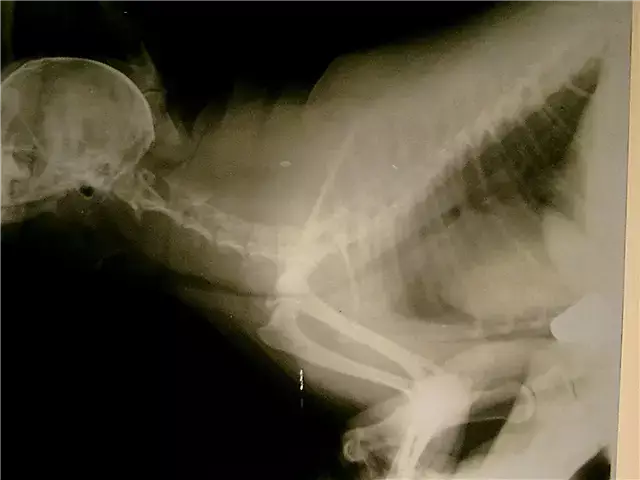- Author Rachel Wainwright [email protected].
- Public 2023-12-15 07:39.
- Last modified 2025-11-02 20:14.
Ascocin
Instructions for use:
- 1. Release form and composition
- 2. Indications for use
- 3. Contraindications
- 4. Method of application and dosage
- 5. Side effects
- 6. Special instructions
- 7. Analogs
- 8. Terms and conditions of storage

Ascocin is a drug that helps to strengthen the immune system.
Release form and composition
The release form of Ascocin is chewable tablets: biconvex, light orange, with orange flavor (10 pieces in aluminum strips, 3 or 10 strips in a cardboard box).
Composition of the preparation: ascorbic acid, sodium ascorbate, zinc oxide.
Indications for use
Ascocin is a metabolic, antioxidant and redox regulating agent.
Vitamin C helps to increase the adaptive capacity of the body and enhance its resistance to infections. Ascorbic acid is involved in the metabolism of carbohydrates, pigments, aromatic amino acids and cholesterol, in redox processes, in blood coagulation, in the synthesis of catecholamines, steroid hormones. Due to its presence in the composition, Ascocin enhances collagen synthesis, stimulates regeneration processes, and normalizes capillary permeability. The drug affects the activation of respiratory enzymes in the liver, which makes it possible to enhance the protein-forming and detoxification functions, as well as to increase the synthesis of prothrombin and collagen. Ascorbic acid causes the anti-allergic and anti-inflammatory effect of the drug.
Zinc, which is part of Ascocin, is a structural component of biological membranes, proteins, and cell receptors. Also, this mineral takes an active part in the reactions of antioxidant and immune defense, the synthesis of amino acids, blood formation, in the process of preserving and transferring genetic information. Being a protein component that carries vitamin A, zinc, together with retinol and ascorbic acid, stimulates the synthesis of antibodies and has an antiviral effect, preventing the occurrence of immunodeficiency. This mineral is also valuable for its participation in the formation of erythrocytes and other blood elements. Ascocin tablets, due to their zinc content, normalize fat metabolism, ensure the normal functioning of the endocrine glands, including the synthesis of growth hormone and insulin, and also support reproductive and sexual functions.
The use of Ascocin is recommended for the treatment of patients with hypo- and vitamin deficiency of ascorbic acid. Also, the drug is used in complex treatment in the following cases:
- Decreased immunity, tendency to infectious, colds and immunodeficiency diseases;
- Nasal, pulmonary, uterine bleeding;
- Radiation sickness;
- Liver diseases (cirrhosis, chronic hepatitis, hepatitis A);
- Nephropathy of pregnant women;
- Addison's disease;
- Long-lasting wounds and bone fractures;
- Overdose of anticoagulants;
- Dystrophy;
- Hypofunction of the prostate gland;
- Atherosclerosis;
- Bronchial asthma;
- Diseases accompanied by damage to the connective tissue (including systemic lupus erythematosus, scleroderma and rheumatoid arthritis);
- Violation of fat, carbohydrate metabolism;
- Strengthening the permeability and fragility of blood vessels;
- Dysfunctions of the endocrine glands.
Contraindications
- Hypersensitivity to drug components;
- Children under the age of 18;
- Thrombophlebitis, diabetes mellitus, a tendency to thrombosis.
For pregnant and breastfeeding women, drug therapy is prescribed only under the supervision of a physician.
Method of administration and dosage
Ascocin should be taken after meals, chewed and washed down with water (in a small amount).
The usual dosage regimen for adults is 1 tablet once a day. In the case of the treatment of infectious diseases and with pronounced vitamin deficiency, the frequency of administration is increased to 2 times a day for 5-7 days.
The course of using this drug is determined by the doctor, focusing on the nature and course of the disease in each case.
Side effects
Ascocin is well tolerated, however, with long-term administration of high doses, undesirable effects may occur:
- Heartburn, vomiting, nausea, diarrhea;
- Headache;
- Destruction of erythrocytes (with deficiency of glucose-6-phosphate dehydrogenase of blood cells);
- Formation of cystine, urinary and oxalate calculi (stones);
- Allergic reactions.
special instructions
The use of high doses of Ascocin requires constant monitoring of renal function and blood pressure (due to the stimulation of vitamin C in the formation of corticosteroids); it is also necessary to control the function of the pancreas, since therapy with this drug inhibits its insular apparatus.
Ascocin in an amount of not more than 1 g per day is taken under medical supervision in the following cases:
- Deficiency of glucose-6-phosphate dehydrogenase;
- Renal dysfunction (hyperoxalaturia, history of urolithiasis);
- High blood iron levels (hemochromatosis, thalassemia, polycythemia, leukemia, sideroblastic anemia (vitamin C increases iron absorption).
Ascocin is prescribed with caution to patients with progressive oncological diseases, since its use can accelerate the course of the process.
As a result of treatment with the use of a medication, the results of laboratory tests and analyzes may change: the presence of glucose, bilirubin in the blood; change in the activity of lactate dehydrogenase, transaminases.
There is no evidence that the drug can adversely affect drivers or people who operate complex mechanisms and are involved in processes that require a high reaction rate.
Analogs
There are no data on analogues of the drug Ascocin with a complex of the same active ingredients.
Analogs of this drug in the pharmacological group: Ascorbic acid, Rosehip fruits, Vita-gem, Coldrex, Tsevikap, Celaskon, etc.
Terms and conditions of storage
Ascocin is available without a prescription.
Store in a dark place at a temperature not exceeding 25 ° C.
Shelf life is 2 years.
Information about the drug is generalized, provided for informational purposes only and does not replace the official instructions. Self-medication is hazardous to health!






